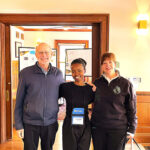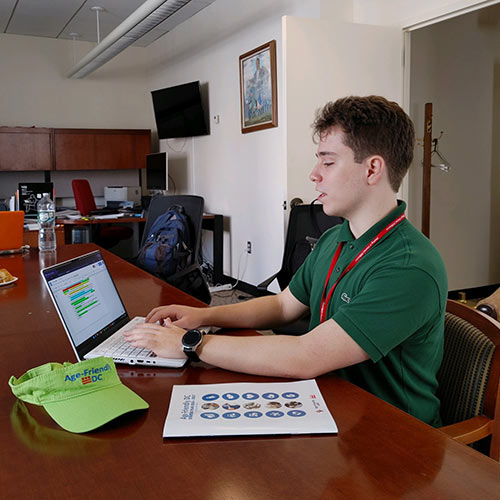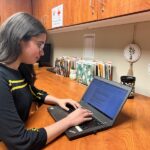
Psychology major takes part in social research for intergenerational programs

Graham Harper ’24, a psychology major at The College of Wooster interned at Age-Friendly D.C., a program which focuses on inclusive ageing. He had a hand in creating proposals and publishing papers involving social research through an APEX Fellowship. With a special focus on intergenerational programs, he also made an effort to enhance health outcomes and inclusivity to benefit worldwide application. Harper’s internship also included creating lifelong education programs through The Smithsonian Institution in Washington, D.C.
“By getting a chance to test and create proposals for social and behavioral interventions on vulnerable, later-in-life populations, I was able to serve communities that have been seldomly investigated.”
—Graham Harper ’24
How did you learn about the internship opportunity for your APEX Fellowship?
“An upper class student who was a former intern at Age-Friendly D.C. recommended that I apply for the experience. The work for the summer of 2022 consisted of a few research projects, all of which matched up to my psychology background quite well, making for a great partnership.”
What were some of the things you did each day?
“By getting a chance to test and create proposals for social and behavioral interventions on vulnerable, later-in-life populations, I was able to serve communities that have been seldomly investigated. No one day looked the same at Age-Friendly D.C. Some days we were assisting in workshops, and others had us in many hour-long Zoom meetings talking about potential research projects. A unique experience was guiding meetings for staff in the mayor’s office and leading comprehensive discussions on public health and inclusivity.”
Who was your fellowship mentor and how did they help you to succeed in this position?
“My fellowship mentor was Leslie Wingard, professor of English. It was always a pleasure hearing back from her, and she turned the journal entries that we completed into a narrative by showing us how many of the problems we faced were interconnected. Professor Wingard taught us to think more broadly through the prompts we were given, and by thinking more broadly, we were more able to tackle problems faced during the experience.”
What are some skills you’ve learned that you see yourself carrying forward in your career?
“I have developed my professional communication skills during this summer experience. It has helped me build new professional relationships. “
How has the internship helped you to see what’s next for you?
“It has helped me realize that I enjoy interacting with individuals from the community but that I also enjoy taking part in research in a lab setting. I hope to combine the two as much as possible, as I want my interactions to help guide my research and what studies would best serve the population at hand.”
Posted in Experiential Learning on August 15, 2022.
Related Posts
Related Areas of Study
Psychology
Do research, work with faculty mentors, and tailor a psychology program to your interests
Major Minor

